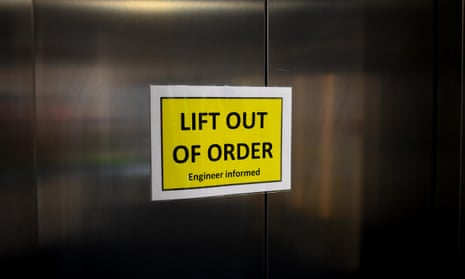Many years ago, aged 16, I broke the law and was remanded in custody to await my trial. I was confined to my cell for up to 22 hours a day and only occasionally got to break the monotony of it all, strolling with my fellow inmates around the prison courtyard. Although my incarceration was short – I got a community service order and a fine – my loss of independence hurt. I vowed I would never return to jail.
I never did, but the onset of multiple sclerosis, and severe disability, meant I went back to that waiting cell, metaphorically speaking. I’ve still got a room with a view, but this time it’s with a life tariff. Doing this type of “bird”, for me and countless others living with a chronic disease, can be hard labour. I count myself lucky, though. Soon after diagnosis I became homeless and went to the local council for help. A few months later they awarded me a flat. My mobility was manageable to start with but over the decade I lived there, the steps up to my flat became too much. My special needs elevated me to the highest band on the transfer list. When a self-contained adapted apartment became available nearby under the management of a housing association, I moved in.
I’ve lived there for eight years now. My disease has continued, confining me to a wheelchair and now affecting my whole body. I can still get out, thankfully, if my energy levels allow. It’s a bit of a lifeline, a chance to share a conversation, an opportunity to feel part of something. However, living on the first floor of a housing block, I have a new incarcerator, whose reliability is often very poor – the lift.
Recently it broke down – again. It was motionless for 10 days. The landlord and lift engineers were quick to blame each other – no one was prepared to take responsibility, leaving me reliant on the goodwill of my neighbour. My problem, though, does not appear isolated. A quick search on Google reveals many others marooned in their flats because of sub-standard services.
A chronic shortage of accessible housing in the UK means that an estimated 1.8 million people with disabilities – 56% of whom are homeowners – are often unable to leave their homes, and many are desperate for alternative accommodation. The case of Richard Chrimes, who has to crawl through his front door because his wheelchair does not fit through the front door of his two-storey house, was recently featured by the BBC. He has to drag himself along the ground to get to his car. After several years he’s still waiting for a home that both he and the council agree is appropriate.
I could have sat there and taken the broken-down lift, but why should I? I’ve done enough time already! As far as I’m concerned, the broken lift infringed my human rights. It stripped me of my independence. So I refused to pay my rent for the period it was out of order and sought compensation for the inconvenience caused. I also made a local councillor aware of my predicament, including him in the “round robin” email correspondence with the housing association. He informed the landlord and me that the lift’s inaction may have broken the 2010 Equality Act. The news seemed to tip the balance. Soon after the lift was fixed, both myself and my neighbour (who is also disabled), received compensation of more than £500 as settlement.
Everyone in the same predicament should think about taking a similar stand. We all have a voice and it is there to be heard. When those voices are amplified, they make a difference – otherwise nothing changes. This was a point of principle, a line I was prepared to hold, whatever the cost. The lift has worked fine since, fingers crossed. Hopefully the payment means a lesson has been learned and any future malfunction will be treated with more urgency.
Future building forecasts and an ageing population mean many more people who become less mobile could be forced to live in properties that ultimately imprison them - little provision is being made for their long-term needs.
It should be enshrined in law that new developments have more accessible housing. It makes sense. More of us are reaching our twilight years and none of us knows what lies ahead.
- Comments are pre-moderated to ensure the discussion is about topics that have been addressed in this article
